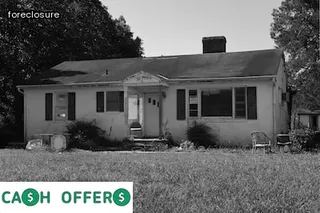New York is a state with incredibly complex foreclosure laws and processes. Homeowners in the Empire State need to understand their rights in order to protect themselves from losing their homes.
Foreclosure is a legal process that allows lenders to recover the money they lent to homeowners by taking away the property that was used as collateral for the loan. In New York, foreclosure proceedings are initiated by filing what is known as a Lis Pendens, or notice of pendency, with the county clerk's office.
Once this document has been filed, a homeowner will receive an official notice informing them of their rights and obligations under New York law. Homeowners have several options available to them including working out a repayment plan with the lender or filing for bankruptcy protection.
It is important for homeowners to act quickly when facing foreclosure since there are strict deadlines for responding to notices and filing paperwork. Additionally, it is advisable for homeowners in New York to seek professional advice from an experienced attorney who can help them navigate the complex legal system and protect their rights throughout the entire process.

When a homeowner in New York faces foreclosure, they must understand the preforeclosure steps the lender will take in order to properly navigate the process. It's important to note that foreclosures vary on a case-by-case basis, so it's wise to consult an attorney who is familiar with New York foreclosure law.
Generally, lenders are required to follow certain procedures before initiating a foreclosure. One of the first steps is sending a notice of default or delinquency letter, which informs the borrower that they're behind on their payments and have a specified amount of time to catch up on them.
The lender may also give the borrower an opportunity to resolve any outstanding balance through a loan modification or forbearance agreement. After this period passes, if there are still past due payments and/or fees, then the lender can file a Notice of Foreclosure with the court, beginning the formal foreclosure process in New York.
Homeowners should be aware that once their property is in foreclosure, their rights are limited and they risk losing their home if they don't take action quickly.
In New York, the foreclosure process begins when a homeowner defaults on their mortgage payments or fails to comply with the terms of their loan. The lender then files a Notice of Default with the county clerk’s office and serves it to the borrower.
The notice gives the borrower 30 days to bring the loan current, during which time the foreclosure process is suspended. If the homeowner does not pay up during this period, then the lender will file a Notice of Sale, which puts the property up for auction in approximately 90 days.
Once this happens, homeowners have only 10 days left to take action and stop the sale by paying off what is owed or negotiating an alternative payment plan with their lender. If neither of these occur, then the property will be sold at auction.
Homeowners should seek legal advice from a qualified attorney as soon as they receive notification from their lender that foreclosure proceedings are underway in order to understand New York's laws regarding foreclosure and maximize their chances of keeping their home.

Stopping a foreclosure in New York can be done in several ways, depending on the homeowner's situation. Firstly, it is important to understand the laws and process that are involved with foreclosures in the state of New York.
A homeowner should seek legal advice to ensure they have a full understanding of their options. One possible way to stop a foreclosure is for the homeowner to apply for loan modification, which involves changing the terms of an existing loan for easier repayment.
Another option is to pursue a short sale, which involves selling the home at market value and having any remaining mortgage debt forgiven by the lender. A third option is to apply for a forbearance agreement, which allows homeowners to temporarily suspend payments while they work out other arrangements with their lender.
Each of these options has potential benefits, so homeowners should consider all their choices carefully before making any decisions regarding foreclosure.
New York State has several specific statutes that limit the rights of lenders to foreclose on a home. The primary law governing foreclosure in New York is the Real Property Actions and Proceedings Law (RPAPL).
This statute requires lenders to provide notice to the homeowner before filing a foreclosure action, and it includes strict timelines for when the lender can begin foreclosure proceedings. Additionally, the RPAPL outlines procedures for how a homeowner may challenge a foreclosure action.
Moreover, New York state has enacted laws that prohibit lenders from foreclosing on certain types of mortgages, such as those held by veterans or those issued by lenders that had certain regulatory violations. Furthermore, New York's Abandoned Property Law prevents lenders from pursuing foreclosure until they have taken necessary steps to locate and contact borrowers who have abandoned their homes.
Finally, New York's anti-deficiency laws protect homeowners against certain types of deficiency judgments if their properties sell at auction for less than the amount of the mortgage debt.

When a homeowner in New York is facing foreclosure, it's important to understand the process and laws that will affect them. Homeowners have certain basic rights they should be aware of during the foreclosure process, such as the right to receive a notice of default, the right to redeem their loan and the right to a court-appointed referee.
Homeowners need to know that they are entitled to receive at least 90 days notice before any proceedings can be initiated against them. This gives them time to negotiate with their lender or explore other options.
They also have the right to attend any foreclosure hearings and present evidence if they choose. Additionally, homeowners may have access to legal aid or consumer counseling services to help them better understand their rights during foreclosure proceedings.
In New York State, borrowers can also apply for a loan modification or repayment plan to save their homes from foreclosure. It is important for homeowners in New York State to understand their rights during the foreclosure process in order to protect themselves from unfair practices by lenders and keep their homes from being lost through foreclosure.
When a homeowner decides to let their home go into foreclosure, they may be surprised to find that there are actually benefits to this process. Foreclosure can provide relief from the burden of debt for homeowners who are overwhelmed by mortgage payments and are unable to keep up with their obligations.
By allowing the lender to take possession of the property, homeowners can avoid further damage to their credit score, as well as potential legal action taken against them. Additionally, if the market value of the property is lower than what is owed on the mortgage, then it's possible that foreclosure could be less expensive than continuing to make payments.
This makes it possible for homeowners to start fresh without an unmanageable debt load. Furthermore, in some cases lenders may offer loan modifications or other forms of assistance during the foreclosure process which could mean more savings for homeowners in the long run.
Ultimately, understanding New York's foreclosure process and laws can help homeowners make an informed decision about whether or not foreclosure is right for them.

In New York, there are several options available to homeowners facing foreclosure. The Homeowner Protection Program (HOPP) offers free counseling to assist homeowners in understanding the foreclosure process, their rights and responsibilities, and exploring potential solutions to their financial situation.
Additionally, the state of New York provides eligible borrowers with a variety of loan modification programs that can help reduce monthly payments or principal balances. These include the New York State Mortgage Assistance Program (NYS MAP), which offers interest-free loans for up to 12 months; the Home Equity Loan Modification Program (HELP), which helps borrowers modify their home equity loan to lower their interest rate and payment amount; and the Enhanced STAR Exemption Relief Program (ESERP), which allows qualified seniors to receive an exemption from property taxes.
Finally, New Yorkers may be able to take advantage of special foreclosure prevention programs offered by banks, credit unions, and other lenders in order to keep their home or renegotiate their mortgage terms. It is important for homeowners in danger of losing their homes due to foreclosure to be aware of all the options available so that they can make informed decisions about how best to handle their financial situation.
Navigating a foreclosure case is a difficult process, and seeking professional help can be beneficial. It is important to understand New York’s foreclosure laws and requirements to protect your rights as a homeowner.
An experienced attorney can provide legal advice on the best approach for your particular situation. They will be able to review any paperwork or documents that you have in order to determine the best steps for you to take.
A lawyer will also be able to assist with filing motions or making arguments before a judge if necessary, as well as attending court appearances on your behalf. Additionally, they may be able to negotiate with lenders or creditors to reduce or eliminate some of the debt owed.
Working with an attorney is an invaluable resource when dealing with a foreclosure in New York.

New York homeowners facing foreclosure have access to a range of resources from local and state agencies that are designed to help. The New York State Department of Financial Services offers guidance for those in the process of foreclosure as well as information about avoiding it altogether.
For example, their website has details on the different types of loan modifications and refinance options available, as well as information about how to contact a housing counselor who can provide advice and assistance. On the local level, NYC Housing Preservation & Development offers free counseling for New York City residents, ranging from how to avoid foreclosure to budgeting tips and resources for finding rental properties or other housing options if necessary.
Additionally, the agency works closely with banks and lenders in order to establish payment plans or renegotiate mortgage terms if needed. Other organizations like Citizen's Advice Bureau also offer advice and resources on housing issues such as preventing foreclosures and finding alternate financing solutions.
With all these different services available, homeowners in New York should be able to find the help they need in order to navigate through the complicated foreclosure process or protect their homes from being taken away.
Foreclosures have a significant and long-lasting impact on credit scores and personal finances. A foreclosure is reported to the three major credit bureaus, which can remain on credit reports for up to seven years.
This impacts individuals’ ability to obtain financing from lenders, who often deny loan applications from individuals with a foreclosure on their record. In addition to lower credit scores, the homeowner may be responsible for any remaining balance owed to the lender after the house is sold at auction.
Depending on the state in which they reside, they may also be liable for additional costs related to legal fees and back taxes. Furthermore, a foreclosure will also prevent an individual from securing future mortgages or refinancing existing mortgages until seven years have passed since the foreclosure has been reported.
Thus, it is important for New York homeowners to understand their options and obligations when facing a potential foreclosure before making any final decisions regarding their property.

Foreclosure is an intimidating and often stressful process for homeowners. Fortunately, there are strategies that can help to avoid or limit damages from a foreclosure.
Financial advisors suggest that homeowners facing foreclosure should be proactive in communicating with their lender. They should make sure they understand the terms of the loan and ask questions if they do not.
Homeowners should also look into other options, such as loan modification or refinancing, as these may provide relief from the current payment requirements. Additionally, some lenders might consider forbearance agreements or repayment plans to help with the financial strain of a foreclosure.
Homeowners should also keep up with payments until a decision is made; if payments are stopped prematurely, it can work against them in negotiations with the lender. Lastly, it is important to seek professional advice when dealing with foreclosures; lawyers and other professionals who specialize in this area can ensure that your rights are protected during the process and can provide guidance on how to best protect yourself financially.
When facing foreclosure, homeowners have various alternatives to traditional mortgage loan modifications. Forbearance is an agreement between the homeowner and lender to temporarily reduce or suspend mortgage payments for a certain period of time.
Refinancing is another option where the homeowner takes out a new loan from a different lender with more favorable terms than their current loan. Homeowners can also negotiate a repayment plan with their lender in which they pay back missed payments over time.
Another option is loan recasting, where borrowers add a lump sum of money to their original loan balance, reducing their monthly payment amount. Finally, deed-in-lieu of foreclosure allows homeowners to give up possession of their property in exchange for the cancellation of their debt.
Each homeowner's situation is unique, so it's important to consider all available options before making any decisions about how best to address a foreclosure situation.

Facing financial difficulties after foreclosure can be overwhelming, however there are options for assistance. New York homeowners who have been foreclosed on should know about the resources available to them.
For example, many of the state’s agencies and organizations offer loan modifications and other options that can help homeowners keep their homes or transition into more affordable housing. Additionally, federal programs such as the Hardest Hit Fund provide grants to help those affected by foreclosure cover expenses such as mortgage payments and home repairs.
Other assistance may come in the form of special tax incentives or foreclosure counseling services offered by nonprofit organizations. It is important to remember that there is help available and to take advantage of it, as it can make a difference in how quickly homeowners are able to recover from foreclosure.
The foreclosure process in New York can be complicated and costly, so it is important for homeowners to understand the laws and regulations that come along with it.
Making a mistake during the process can be extremely costly, so it is important to know what to avoid.
The most common mistakes made during a New York foreclosure process include failing to respond to legal documents, missing required deadlines or court hearings, not attending mediation sessions or settlement conferences, failing to make payments on time, not keeping up with property maintenance, continuing to live in the property after receiving an eviction notice, and refusing to cooperate with a lender.
It is also important for homeowners to know their rights when facing a foreclosure; understanding this information can help prevent costly mistakes during the process.

When facing foreclosure in New York, homeowners should take proactive measures to prepare for the process. Knowing the laws surrounding foreclosures is key to navigating them successfully.
Researching and understanding all available options before entering a preforeclosure period can help homeowners make informed decisions. Consulting with a qualified attorney or financial advisor can provide invaluable information and guidance.
It is also important to stay organized, track communication from lenders and other parties, and keep copies of all documents related to the foreclosure. Additionally, it may be beneficial to seek out assistance from housing counselors and financial institutions for additional support during the process.
Taking these steps prior to entering a preforeclosure period can help ensure that homeowners understand their rights and obligations throughout the process of foreclosure.
It is important to understand all of your options before deciding whether to sell or let your home go into foreclosure. New York homeowners should become familiar with the foreclosure process and laws in their state to make the best decision possible.
Understanding the process and laws may help you find a way out of the financial difficulties that led to foreclosure. It is critical that you reach out for help from legal professionals, housing counselors, or nonprofits who are well-informed on these matters such as Homeownership Preservation Foundation.
They can provide information about refinancing, loan modifications, repayment plans, bankruptcy, and other options available to keep your home from being foreclosed upon. You should also seek advice from trusted family members and friends who have been through this process before to get an understanding of how it works.
Before proceeding with any decision, make sure that you understand all the details involved in legally selling or letting your home go into foreclosure.

Understanding the different types of mortgages and loan terms related to taxation that may be available to homeowners in New York who are facing foreclosure is an important part of the process. It is essential for individuals to understand the differences between a fixed-rate mortgage, adjustable rate mortgage (ARM), and other loan types which may offer tax benefits.
Tax deductions can play a major role in offsetting costs associated with foreclosure and it is important to explore any potential options that could help reduce total expenses. Homeowners should also be aware of how they may be able to refinance their current loan or if they are considered eligible for an equity loan that could provide additional funds during this challenging time.
Consulting with a knowledgeable financial professional can be beneficial when determining the best course of action when considering foreclosure.
The coronavirus pandemic has caused financial hardship for many New York homeowners, leaving them vulnerable to foreclosure. Fortunately, there are several legal protection and support programs available to help these individuals.
The Mortgage Assistance Program (MAP) provides eligible homeowners with up to $20,000 in interest-free loans to pay their mortgage and other housing expenses. The Emergency Rental Assistance Program (ERAP) offers one-time payments of up to $2,000 for rent and utility bills for those facing eviction or foreclosure due to COVID-19 related financial issues.
Additionally, the Homeowner Protection Program (HOPP) helps homeowners who are struggling financially by providing free legal assistance and advising on loan modifications, refinancing options, foreclosure prevention strategies, and more. Finally, the NYS Attorney General's Office also provides free mediation services to assist homeowners in negotiating with their lenders and finding solutions that will enable them to keep their homes.
These programs offer much needed support during this difficult time so that homeowners can get back on their feet.
In New York, the foreclosure process and laws for homeowners can be complex. The length of time it takes a bank to foreclose on a house in New York depends on several factors, including the type of loan taken out and the borrower's ability to make payments.
Generally, if a homeowner has defaulted on their mortgage payments, it may take anywhere from three to eighteen months for the lender to complete the foreclosure process. However, if a homeowner is able to make up any past due payments and remain current on their mortgage payments during this time period, then the lender may not move forward with foreclosure proceedings.
In addition, certain types of loan modification programs may provide an additional option for homeowners who are facing foreclosure in New York. It's important for homeowners to understand their options and seek professional advice when facing foreclosure in order to help protect their rights as property owners.

People can let their house go into foreclosure for many different reasons. Financial hardship, job loss, and medical bills are some of the most common causes of foreclosure.
In some cases, homeowners may simply be unable to afford the mortgage payments or no longer have an income to cover them. Other times, a sudden expense or major life event like a divorce or illness can lead to an inability to pay the loan.
Homeowners who find themselves in these situations should familiarize themselves with New York's foreclosure process and laws so they can make informed decisions about their financial future. Understanding how foreclosures work in the state can help people avoid them altogether if possible or navigate through the process if it is unavoidable.
In New York, the pre-foreclosure process can vary depending on the circumstances of each individual case. Generally speaking, a house can stay in pre-foreclosure for up to six months, though this time-frame may be shorter or longer depending on a variety of factors.
During this period, homeowners should take advantage of counseling services and other resources offered by state and county agencies to better understand their options. Additionally, homeowners should be aware that once the lender has initiated the foreclosure process an auction may occur at any time within the six month period.
Understanding New York's foreclosure laws is critical for homeowners facing foreclosure as they navigate their options to avoid losing their home.
Foreclosures are a complex process that can be difficult to navigate. In New York, the foreclosure process begins with the lender filing a complaint in court, initiating an action against the homeowner.
Once this has been done, the homeowner will receive a summons and complaint which outlines the amount owed and provides information on how to respond. If the homeowner is unable to make payments or otherwise resolve the debt, they may be forced into foreclosure proceedings.
During these proceedings, a judge will review all of the evidence and determine whether or not foreclosure should take place. If it is determined that foreclosure is necessary, then the lender can either sell the home at auction or repossess it directly from the homeowner.
In either case, it is important for homeowners to understand their rights under New York state law when facing foreclosure so that they can best protect themselves and their property during this difficult time.